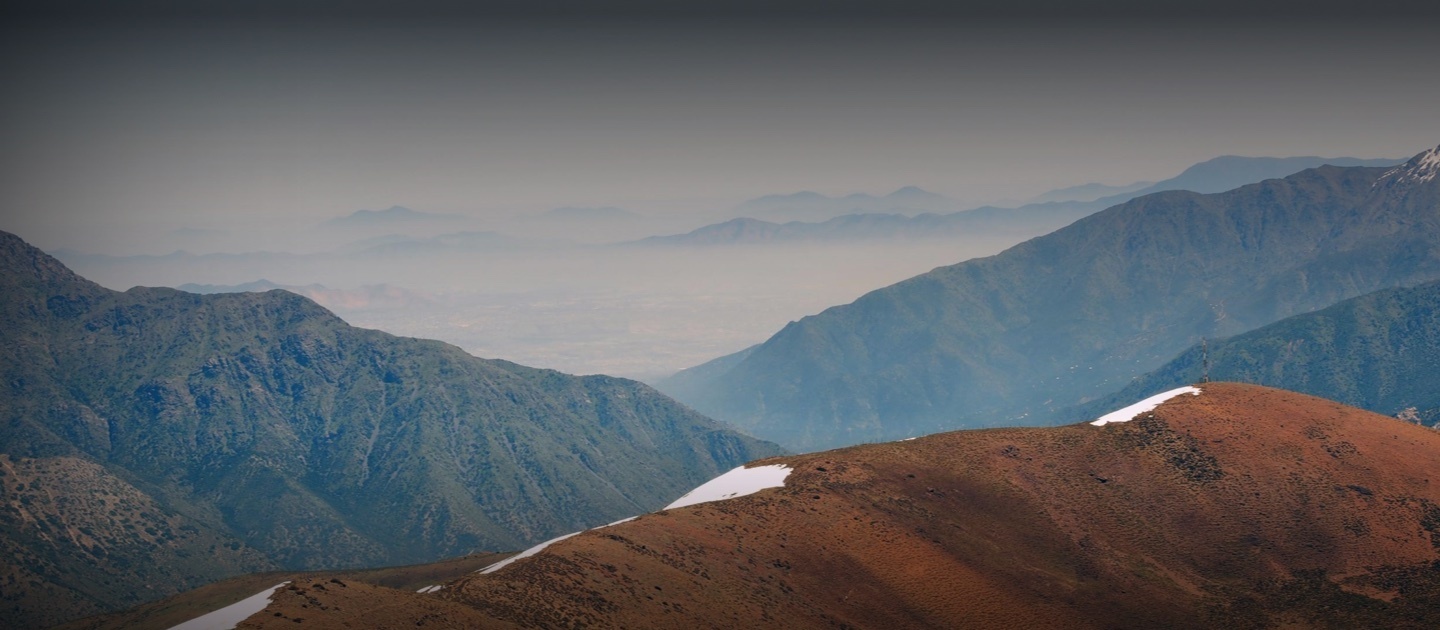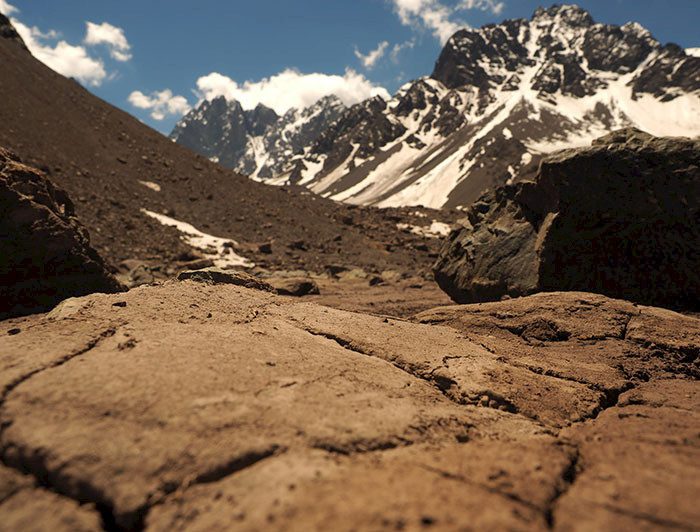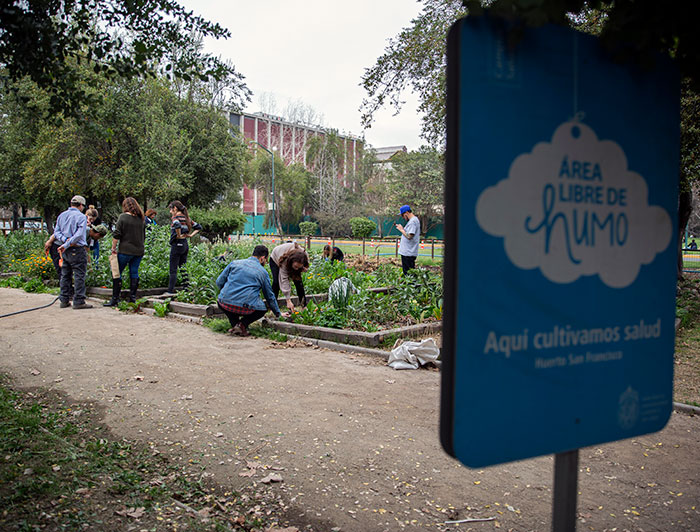
UC and its Path in Fighting Climate Change
Experts say our planet is in crisis. And some of its consequences are irreversible, but not all is lost. We have committed to being carbon neutral. What does it mean and how will we approach this challenge? We will tell you here.

photo_camera The great environmental crisis of planet Earth has a name: Climate Change. The greenhouse effect is the main driver of climate change and is responsible for the melting of the polar ice caps, droughts, glacier melting, among other effects. (Credit): Valle Casa de Piedra, RM/Nicole Saffie
On July 30, 2019, Pontificia Universidad Católica de Chile signed a commitment to increase its contribution to curbing the effects of climate change affecting our planet. During the signing, the University President Ignacio Sanchez, the former Chilean Minister of the Environment, Carolina Schmidt, and other university authorities announced that our institution would become carbon neutral by 2038.
This agreement is in response to Pope Francis' invitation to care for our Common Home, seeking coherence between what is taught and the way we live and inhabit our campuses, spaces, and the planet.
Climate Change
The tremendous environmental crisis of planet Earth has a name: Climate Change. This phenomenon of climate transformation is caused by direct and indirect human activities that alter the atmosphere's composition.
Among the consequences of climate change is the melting of the polar ice caps, the melting of glaciers, rising sea levels, droughts, rising temperatures, extreme weather events, among other harmful effects.
Climate change is a consequence of the greenhouse effect, which is due to the uncontrolled emissions of CO2 (carbon dioxide) linked to productive human activity. Warming occurs when the atmosphere traps the heat that radiates from the Earth into space.
Certain gases in the atmosphere block the heat from escaping. Long-lived gases that remain semi-permanently in the atmosphere and do not respond physically or chemically to temperature changes are described as "forcing" climate change. Gases, such as water vapor, which respond physically or chemically to temperature changes, are seen as "feedback."
This scenario, which has been forged since the industrial revolution and now carbon (CO2) emissions, has reached levels never before seen in history. This increase in emissions is mainly due to fossil fuels such as coal, oil, and natural gas, which store carbon in the soil. These are mined for use in industries, automobiles, and power plants.
According to Sebastián Vicuña, professor of the School of Engineering and director of the UC Center for Global Change, we are in a crisis since the planet's temperature has increased 1ºC compare with the industrial revolution. With an increase of 1.5ºC, the damages will be tough to reverse.
"Some effects are happening now that we cannot stop. For example, droughts are an early display of these impacts," said Vicuña.
All these changes that the planet is experiencing and, consequently, all the forms of life living in it are due to human intervention. In 2000, researchers Paul J. Crutzen and Eugene F. Stoermer proposed a new geologic period, the Anthropocene, the most recent period in Earth's history when the human activity started to have a significant impact on the planet. "Humans are 100% responsible for climate change," said Sebastián Vicuña.
UC's Commitment

Last year, on the COP25 world summit, and the urgency to take action for the climate, the university was invited to sign the Global Climate Letter. Pontificia Universidad Católica de Chile, represented by its President, Ignacio Sánchez, was the first Chilean higher education institution to join this call, which brought the commitment to become a carbon-neutral university.
UC set out to meet this goal by 2038, on the same date of its 150th anniversary, and twelve years ahead of the national plan to make Chile a carbon-neutral country by 2050.
"For more than ten years, our university has been taking steps to address climate change. We have been inspired by the mission we have and by the call made by Pope Francis to take care of our common home," said the University President on that occasion.
For Maryon Urbina, director of UC Sustainability, the commitment made by our university is a sense of responsibility within Chile. "First of all, the urgency of climate change leaves us with a small window for action, and we, the institutions of higher education, have to set an example by showing internal coherence and looking for solutions for the country," she stated.
"We also know the importance of the educational spaces generated within our classrooms. Our university graduates have the opportunity to impact their workspaces. Some of them will also be part of large spheres of influence, and if we continue to educate them on sustainability, they will be able to take their knowledge to generate the great changes that we need."
When talking about carbon neutrality, there are two ways to achieve this goal. The first is mitigation and reduction of emissions, while the second has to do with compensation. Within these alternatives, UC will follow the first way to put its focus on action, committing to neutrality in scopes 1, 2, and 3, which are detailed below:
- Scope 1: Heaters, own vehicles, and refrigerants.
- Scope 2: Electricity.
- Scope 3: Daily community transfers, academic trips, waste, and paper purchases.
Our carbon footprint in 2018 was 32,168 tons of CO2, while scopes 1, 2, and 3 accounted for 4.2%, 35.3%, and 60.5% of the emissions, respectively.
However, the university is not starting from scratch in this challenge. As Maryon Urbina said, "The institution has been measuring its carbon footprint since 2013. Based on this, we have already taken a series of measures to reduce our daily operations' impact.
Among these measures are the replacement of lights, placing recycling systems on all campuses, the transformation of the San Joaquin campus into a pedestrian space, promoting sustainable modes of transportation, and actions to discourage single-use plastics, among others."
The Process

The first stage of this process includes implementing ten thematic round tables focused on:
- energy,
- transport,
- waste,
- construction,
- water,
- biodiversity and capture,
- research,
- education,
- culture,
- communication, and participation.
Each of them includes professors, researchers, students, officials, and professionals who are developing the plans and the carbon-neutral strategy's technical part.
Within this group is Sofía Gutiérrez, a fifth-year Biological Sciences student, who integrates the biodiversity and capture table as an assistant. According to her, being able to participate has been an excellent academic and collaborative opportunity. "I have had the opportunity to work and be part of instances where I have learned a lot. The way they have involved us as students has been very inclusive, and I have felt like a peer," she said.
After the September break, a process of participation will be started for the UC community to participate. The goal is for each member of our university to share their ideas, opinions, and guidelines on how we can move forward to build a carbon-neutral UC.
According to Maryon Urbina, participation includes everyone who is part of our university, since beyond implementing projects, the daily action and commitment of the entire community is needed.
"It is important that we are aware of the socio-environmental crisis we are experiencing. Pope Francis has called us to action, and one of his great concerns is climate change. We cannot be indifferent to this urgency, and as a community, we have to rethink our daily habits, even beyond our campuses, and permeate the world, as this is a global challenge. We need this to be a collective effort through action and empathy for humanity and future generations," she concluded.


